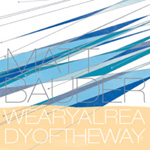|
|
 |
Dusted Reviews
Artist: Matt Bauder Album: Weary Already of the Way Label: 482 Music Review date: Apr. 27, 2004 |

|
|
|
 |
Chicago and Northern Europe share a physical and philosophical nexus when it comes to creative improvised music. Cobbled together largely through the coalition-building efforts of folks like Ken Vandermark and John Corbett, a conduit of idea sharing continues to enrich the scenes on both sides of the Atlantic. Neither man has a direct hand in Matt Bauder’s Weary Already of the Way, but the cross-pollinating environment they pioneered has obviously had an effect on the young reed player. There’s also the influence of Rob Mazurek’s various ambient-heavy bands as well as the sepia-saturated tone poem paintings characteristic of cellist Fred Lonberg-Holm’s work in the Boxhead Ensemble. Not coincidentally, both Mazurek and Lonberg-Holm hold posts in Bauder’s studio septet. Several other Windy City notables round out the ranks, including Jeb Bishop on trombone, Todd Margasak on cornet, Jason Roebke on bass and Aram Shelton on reeds.
Four tracks materialize and dissipate in just over fifty minutes. The disc’s tray card does not credit anyone with electronics. Even so, beeps and buzzes are all over these pieces, sometimes blending with the Morse code blips from the horns. These sounds are actually the result of Bauder’s post-performance studio manipulations. He spliced and edited together the musicians’ parts, often recorded independently of each other, to create the compositions. On the opening piece, there’s a sudden switch from this sort of pointillistic patchwork to the overlapping legato cornet and clarinet lines. The strings of Roebke and Lonberg-Holm enter soon after, the former favoring a fleshy pizzicato while the latter etches high arco swathes. A somber fanfare atmosphere develops. Chains of electronics-sounding snippets return for the close, drizzling across a single high-pitched drone.
The disc’s two middle pieces are shorter in duration. Each hovers around eight minutes and hatches similar tempo-less orchestrations that employ various groupings of instruments. On “2,” muted cornets sputter loquaciously over dour strings and reeds. Pitch and texture usually win out over any overt melodic or rhythmic structure. When lyrical motifs do surface, they commonly form from layered elongated notes. This sort of approach works beautifully during the harmonizing that occurs toward the end of the second track.
Strings often become nearly indistinguishable from reeds. Both cover the similar tonal regions with an uncanny chameleonic accuracy. The thematic extrapolation that exists is gradual. The methodical nature of the results is effective in inducing the prevailing melancholy suggested by the disc’s title. On paper, the preference for building brick by introspective brick might appear a case of egotistic navel-gazing, but Bauder and his band resist such self-indulgences. An enveloping and enticing logic prevails throughout both the players’ constructions and those of the leader in reshaping their base materials.
The program’s final piece actually features some of the most ‘jazz’-tethered playing of the set. It also feels the most formally structured, with Bauder’s vibrato-soaked tenor bleating out a repeating motif on top of craggy arco strings. Mazurek and Bishop join the action and soon a revolving exchange of interlocking lines develops. Energized by the ensemble, the piece morphs into another fanfare finish laced with dulcet electronics that fades by degrees into silent oblivion. Bauder’s music may take some time to warm to, but he’s definitely on to something here. It’s a direction that deserves the room and resources for further growth.
By Derek Taylor
|







